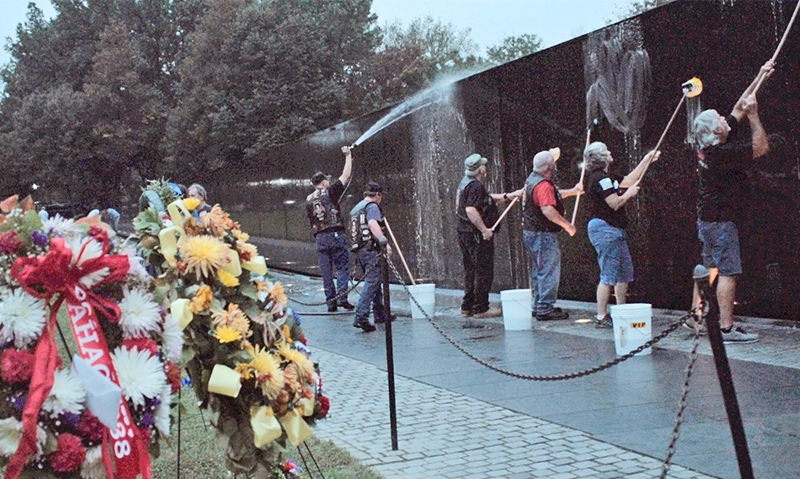
A chance to both honor and heal
Over the course of a few early October days, a group of more than 40 American Legion Riders departed their home state of South Carolina for the nation’s capital. They came to Washington, D.C., to clean the Vietnam Veterans Memorial on Oct. 7 as a way to honor those whose names are on the wall.
But it was a little more personal for Casey Koerner, a Legion Rider from Horry Post 111 in Conway, S.C., and a Vietnam War U.S. Air Force veteran. Koerner’s cousin, U.S. Marine Corps Pfc. Frank M. Koerner, was killed in action in Vietnam in 1969.
“He and I, we grew up pretty much in the same house like brothers,” said Koerner, who served in the Air Force from 1973 to 1982. “I come up every Memorial Day. This was our first opportunity to come up and wash the wall. I made sure I washed (his cousin’s panel).”
Koerner said cleaning his cousins panel was “very emotional. Very moving. He’s actually buried in West Virginia, but I feel closer to him here than I do actually at his gravesite. We’re fellow veterans, and I came back and he didn’t.”
Some of the Legion Riders rode as many as 500 miles to take part in the cleaning after having cleaned the Vietnam Veterans Memorial five years ago. “We’ve always wanted to do it again,” said South Carolina Legion Riders Director L.V. Harrison Jr., a member of Richland Post 6 in Columbia, S.C. “This has been in the works for the last year to get a date secured and to get everyone committed to come. It’s something that we’re going to continue to do in the future.”
Harrison said the Riders appreciated the opportunity to “be able to give back, and show that honor and respect to those that have served our country – especially our brothers and sisters that served in Vietnam.”
Harrison coordinated the effort through the National Park Service. U.S. Park Ranger Mark Morse, a U.S. Army veteran, met the group in the early hours on Sunday with all the materials needed to do their job.
Morse said groups will volunteer to clean the memorial at least once a week from mid-April to mid-November. And while the volunteers provide “an incredible value” to the Park Service, Morse said what the volunteers get back from their effort is equally valuable. “This wall was built to heal wounds of war. When you have (someone with a family member) on this, and he or she gets to wash that name, there’s still that connection of family.”
Seeing that connection is why Morse had no problem meeting up with the Riders at 6:30 a.m. on a Sunday morning to help with their project. “I love to see the camaraderie between all of us veterans and the families that come out here,” he said. “A lot of time for Vietnam vets, it’s their first time out here. Their panel with their buddies’ (names) on the wall, that panel is reserved for them to wash and honor.”
Ralph Wainright, a Legion Rider from Jesse C. Lynch Memorial Post 71 in North Augusta, S.C., served in the U.S. Army from 1969 to 1993. He left South Carolina on Oct. 4, making the trip in two days “because we’re getting old,” he said.
But age wasn’t going to stop Wainright from participating in the volunteer effort. “For me, it’s an honor,” he said. “I had a brother who served in Vietnam. He survived Vietnam, only to come home and get killed about two years later in an industrial accident. I do it in his honor. I do it for my brother Joe.”
The cleaning effort also provided an opportunity for camaraderie for Wainright and the other American Legion Riders.
“We get to see the other Riders from the state,” he said. “We’re all over the state, so we only get together 2-3 times a year. So it’s kind of an honor for all of us to work together as a team. Each post or each chapter does their own things in their areas, but it’s like once or twice a year we get together and do something together.”
Though he was much too young to serve in the Vietnam War, Harrison sees what being at the wall means to those veterans who did. “This is a healing process for the Vietnam veterans,” he said. “This wall means so much to them, and they hold it in such high regard because this is where their brothers’ and sisters’ names are inscribed (and) that paid the ultimate sacrifice.”
